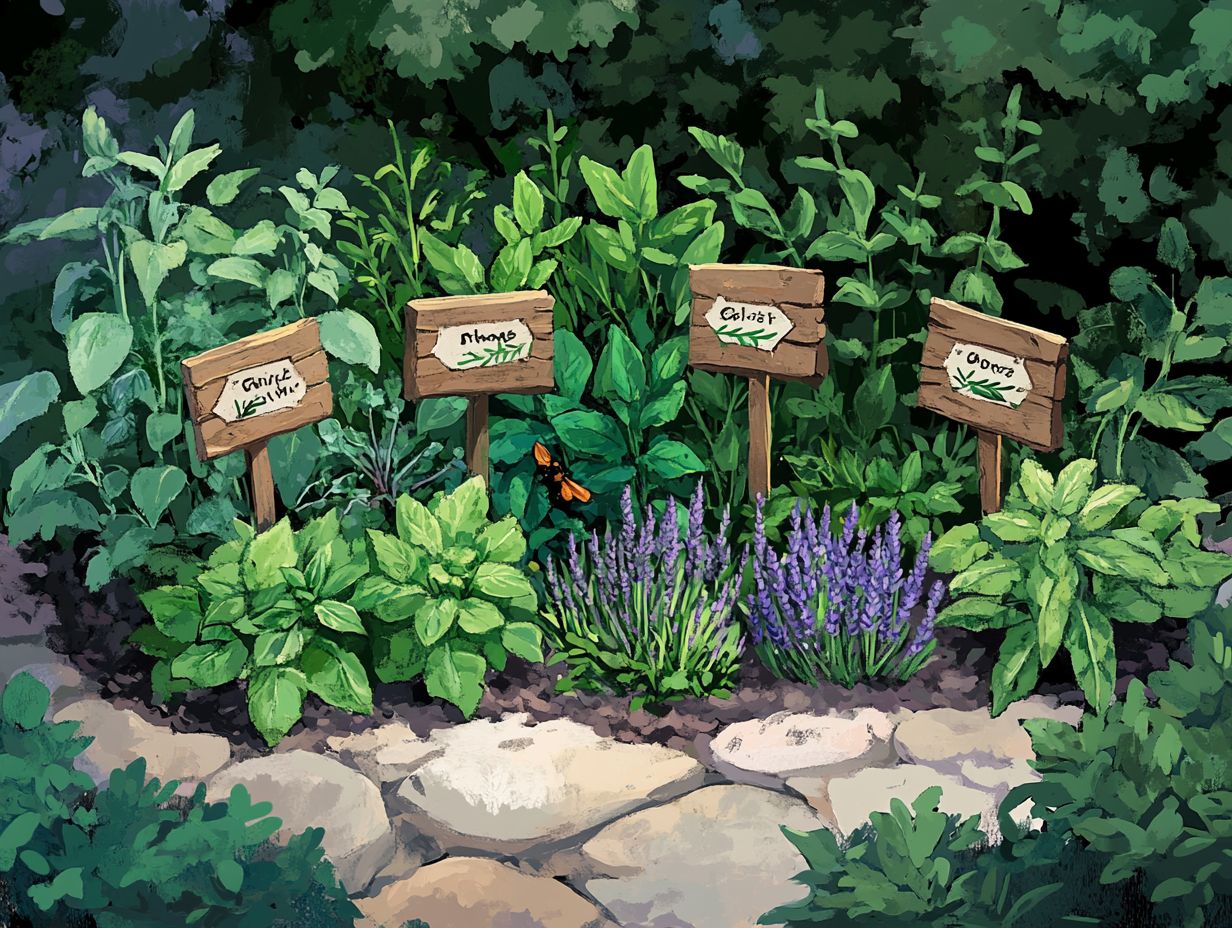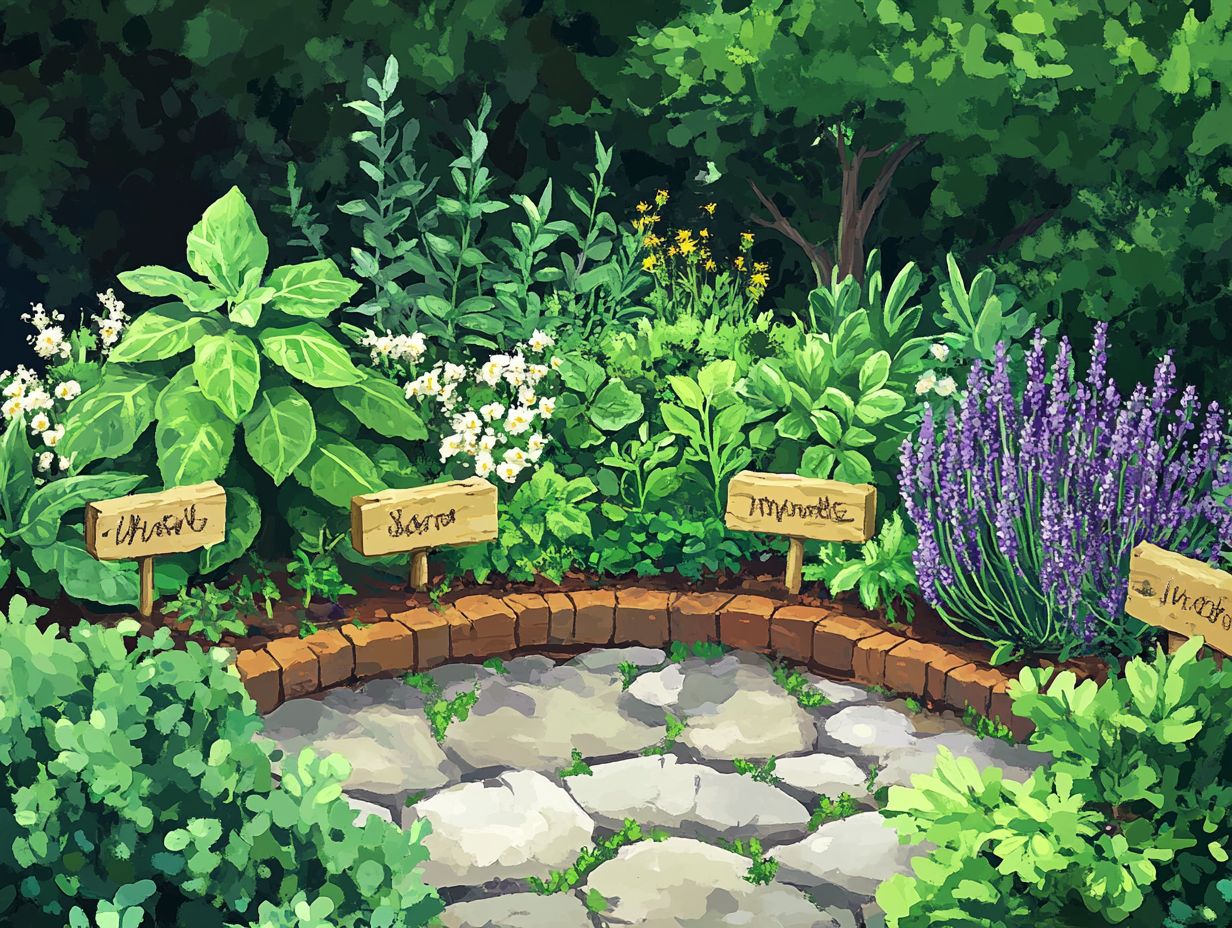5 Herbs That Naturally Repel Pests
If you find yourself weary from the constant struggle against pesky insects in your garden or home, rest assured, you re in good company. Fortunately, nature provides some exceptional solutions!
Get ready to discover five powerful herbs mint, lavender, rosemary, basil, and chrysanthemums that not only elevate your culinary delights but also act as formidable pest repellents. Learn how these herbs function, uncover their additional benefits, and gather insights on how to incorporate them alongside other pest control methods. Wave farewell to harsh chemicals and embrace a more natural approach!
Contents
Key Takeaways:

- Mint, lavender, rosemary, basil, and chrysanthemums are natural herbs that effectively repel pests.
- These herbs can be used in various forms to repel pests, such as by growing them in gardens, creating essential oils, or using them in homemade sprays.
- Unlike chemical pesticides, these herbs have no known risks or side effects and also offer additional benefits, such as promoting relaxation and improving air quality.
1. Mint
Mint is a fragrant herb celebrated for its aromatic properties. It is not just a charming addition to your garden; it serves as a powerful way to keep pests away. This herb effectively repels a variety of insects, including mosquitoes, making it essential for growing food in cities and gardening that is good for the environment.
To fully harness its potential, consider cultivating varieties such as peppermint and spearmint. These thrive in full sun and well-draining soil, conditions critical for robust growth. This environment allows the mint to release the oils that fend off pests.
You might also want to explore Do It Yourself (DIY) repellent recipes featuring mint essential oil. By combining it with carrier oils or witch hazel, you can create effective sprays that provide a chemical-free way to keep insects at bay. These preparations also provide a refreshing scent that enhances your outdoor spaces, elevating your overall gardening experience.
2. Lavender
Lavender, with its enchanting scent and vibrant purple blooms, is not just a pretty face in your garden; it s also a powerful ally against pesky insects like mosquitoes and flies. It beautifully combines aesthetics with functionality, elevating your outdoor space.
Depending on your climate and growing zone, you ll find various types of lavender that thrive. For instance, English lavender loves cooler regions, while French lavender prefers warmer climates. Each variety brings unique essential oil properties, amplifying their natural pest-repelling prowess.
But the benefits don t stop at the garden gate. You can use dried lavender in sachets to infuse a calming aroma into your closets. If you re feeling crafty, incorporating essential oils into DIY pest repellents will keep those unwanted critters at bay without harsh chemicals. Experimenting with these aromatic gems enhances not only your outdoor spaces but also introduces delightful fragrances into your home.
3. Rosemary
Rosemary isn t just your go-to culinary herb, celebrated for its delightful aroma; it also doubles as a natural bug repellent, efficiently keeping those pesky insects at bay. This makes it an invaluable addition to your garden or herbal landscape.
With its evergreen foliage and charming purple flowers, rosemary thrives in well-drained soil under full sunlight, making it a prime choice for gardens designed with pest control in mind. Cultivating rosemary is a breeze just ensure it basks in at least six hours of sunlight each day and avoid overwatering to prevent root rot.
In the kitchen, its robust flavor enhances dishes like roasted meats, soups, and breads. When you incorporate rosemary into your floral borders, it beautifies the space while deterring unwanted garden insects, fostering a healthier ecosystem overall.
4. Basil

Basil is not just a beloved herb in your culinary repertoire; it s a champion in the battle against pesky insects like mosquitoes and flies. This dual-purpose plant enhances both your kitchen creations and your garden’s resilience against unwelcome visitors.
With a variety of types at your disposal, including sweet basil, Thai basil, and lemon basil, each boasts unique essential oils that naturally deter harmful insects. When you decide to grow basil, remember to provide well-draining soil and regular watering to keep those vibrant, lush leaves thriving.
Incorporating fresh basil into your dishes not only elevates flavors but also lets its pest-repelling properties work effectively whether you choose to plant it in your garden or keep it in pots on your windowsill. With careful cultivation and thoughtful use, basil can seamlessly weave pest control into your culinary adventures.
5. Chrysanthemums
Chrysanthemums, often affectionately referred to as mums, are not just celebrated for their vibrant blossoms adorning floral borders; they also serve as highly effective insect-repelling plants that help keep pests at bay, fostering a healthier, bug-free garden environment.
Consider the various types of chrysanthemums, such as the hardy Florist s Chrysanthemum and the resilient Shasta Daisy. They have garnered acclaim not only for their stunning visual allure but also for their exceptional pest control capabilities. These plants thrive in well-drained soil and create a flourishing garden space that harmonizes beauty with functionality.
By attracting beneficial insects like ladybugs and lacewings, these colorful blooms enhance natural pest management while infusing your landscape with a spectacular array of colors. Incorporating chrysanthemums into your garden not only elevates the aesthetic charm of your surroundings but also provides eco-friendly pest deterrence, making them an invaluable asset for any gardener.
What Makes These Herbs Effective Pest Repellents?
These herbs work wonders against pests because of their strong scents and natural oils. Additionally, using vinegar as a pest repellent can further disrupt the sensory receptors of various insects, making them less likely to invade your garden or home, thus offering a natural solution to pest control.
Research indicates that oils extracted from plants like citronella, eucalyptus, and lavender are particularly potent against nuisances such as mosquitoes, ants, and flies. For example, entomologists have found that citronella oil can keep mosquitoes at bay for up to two hours when applied properly.
Experts often recommend incorporating essential oils like peppermint and tea tree into your pest-repelling arsenal, as they not only deter pests but also offer antifungal and antibacterial benefits, creating a healthier living environment.
By harnessing the natural power of these aromatic herbs, you can adopt a more sustainable approach to pest management, reducing your reliance on chemical pesticides while fostering a harmonious relationship with nature.
How Can These Herbs Be Used to Repel Pests?
These herbs serve as your allies in the battle against pests, and you can employ various methods to harness their power. Consider strategically planting them in your garden, crafting DIY repellents with their essential oils, or utilizing dried herbs in sachets. Additionally, you can explore homemade remedies for common garden pests to keep insects at bay in your home.
To begin, think about incorporating herbs like basil or mint around your vegetable garden. Their robust aromas can effectively confuse and deter unwanted pests. For more information, check out 5 ways to encourage pollinators and control pests. If you’re inclined to create your own natural sprays, simply gather the leaves of these herbs and steep them in hot water. Once cooled, strain the mixture into a spray bottle, and you have an all-natural solution ready to apply directly to affected plants.
You can also fill small fabric pouches with dried herbs such as lavender or rosemary to work wonders. Hang these in your closets and place them in corners to deter moths and other intruding insects. By employing these techniques, you not only nurture a healthier garden but also maintain pest-free living spaces.
Ready to take charge of your garden and keep pests away naturally?
Are There Any Risks or Side Effects of Using These Herbs?

Using herbs as natural bug repellents can be a safe choice. However, it s important to be aware of potential risks and side effects. Allergic reactions can occur in sensitive individuals, and some essential oils might harm beneficial insects, disrupting the ecological balance.
Not every herb suits every environment. What thrives in one setting could unintentionally harm beneficial insect populations in another. Make sure to consider the specific plant species and ensure accurate identification. Misidentifying herbs can lead to unintended consequences for both pets and local ecosystems.
Moderation is crucial. Overusing certain herbal preparations can lead to toxic build-up in the soil, affecting not just the pests you aim to control but also the health of your garden.
By understanding these nuances, you can effectively incorporate herbs into your pest management strategies while protecting the environment.
What Other Benefits Do These Herbs Offer?
In addition to their incredible ability to repel pests, these fragrant herbs provide a wealth of benefits, including culinary delights, therapeutic properties, and contributions to organic gardening. They not only enhance your diet but also boost your overall well-being while utilizing simple pest control hacks for gardeners to manage pests naturally.
These herbs are culinary game-changers that infuse meals with a freshness that elevates taste and enjoyment. Beyond the kitchen, their healing properties offer remedies for various ailments, including digestive issues and anxiety.
To unlock their potential, consider brewing soothing teas, crafting invigorating herbal oils, or simply adding sprigs to your water for a refreshing twist. This promotes holistic wellness while inviting vibrant aromas and flavors into your life.
Can These Herbs Be Used in Conjunction with Other Pest Control Methods?
Yes! You can effectively use these herbs, as detailed in how to use companion herbs for pest control, along with other methods to create a holistic approach to managing insects in your garden. By combining their natural repellents with sustainable practices, you set the stage for optimal results.
Strategically incorporating these aromatic plants can enhance your pest management strategy. Consider introducing beneficial insects like ladybugs and lacewings, which naturally combat aphids and other pests. You can also use physical barriers such as row covers or fine mesh nets to protect your plants from larger insects while welcoming essential pollinators.
Maintaining garden hygiene is essential. Regularly removing debris and diseased plant material minimizes pest habitats, fostering a balanced ecosystem where beneficial insects can thrive. This leads to a healthier and more productive garden, ensuring your efforts yield rewarding results.
Frequently Asked Questions
Curious about the 5 herbs that naturally repel pests?

The five herbs that naturally repel pests are peppermint, lavender, rosemary, basil, and citronella, and you can find more information about them in the article on plants that repel common garden pests.
Wondering how these herbs repel pests?
These herbs contain natural oils and compounds that pests find unpleasant, making them some of the top pest-resistant plants for your garden and causing them to stay away.
Can I plant these herbs in my garden to repel pests?
Absolutely! Planting these herbs in your garden will not only repel pests but also add delightful aromas, as well as using essential oils to deter pests.
Which specific pests do these herbs repel?
Peppermint repels ants, spiders, and mosquitoes; lavender keeps away moths, fleas, and flies; rosemary deters mosquitoes and flies; basil repels flies and mosquitoes; and citronella is effective against mosquitoes and other flying insects.
How can I use these herbs to repel pests indoors?
You can create a natural pest repellent spray by steeping the herbs in boiling water, straining the liquid, and adding it to a spray bottle. Additionally, consider using citrus peels for pest prevention by placing fresh or dried herbs around your home to keep pests at bay.
What are the benefits of using these herbs as pest repellents?
These herbs are not only effective pest repellents, but they also have health benefits.
They can be used in cooking and even for relaxation techniques like aromatherapy.
Plus, they are safe for your pets and children. This makes them a fantastic alternative to harsh chemical repellents!






